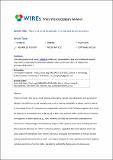Theory of mind in animals : current and future directions
Abstract
Theory of mind (ToM; a.k.a., mind-reading, mentalizing, mental-state attribution, and perspective-taking) is the ability to ascribe mental states, such as desires and beliefs, to others, and it is central to the unique forms of communication, cooperation, and culture that define our species. As a result, for 40 years, researchers have endeavored to determine whether ToM is itself unique to humans. Investigations in other species (e.g., apes, monkeys, corvids) are essential to understand the mechanistic underpinnings and evolutionary origins of this capacity across taxa, including humans. We review the literature on ToM in nonhuman animals, suggesting that some species share foundational social cognitive mechanisms with humans. We focus principally on innovations of the last decade and pressing directions for future work. Underexplored types of social cognition have been targeted, including ascription of mental states, such as desires and beliefs, that require simultaneously representing one's own and another's conflicting motives or views of the world. Ongoing efforts probe the motivational facets of ToM, how flexibly animals can recruit social cognitive skills across cooperative and competitive settings, and appropriate motivational contexts for comparative inquiry. Finally, novel methodological and empirical approaches have brought new species (e.g., lemurs, dogs) into the lab, implemented critical controls to elucidate underlying mechanisms, and contributed powerful new techniques (e.g., looking-time, eye-tracking) that open the door to unexplored approaches for studying animal minds. These innovations in cognition, motivation, and method promise fruitful progress in the years to come, in understanding the nature and origin of ToM in humans and other species.
Citation
Krupenye , C & Call , J 2019 , ' Theory of mind in animals : current and future directions ' , WIREs Cognitive Science , vol. Early View , e1503 . https://doi.org/10.1002/wcs.1503
Publication
WIREs Cognitive Science
Status
Peer reviewed
ISSN
1939-5078Type
Journal item
Description
C.K. was supported by European Commission Marie Skłodowska‐Curie fellowship MENTALIZINGORIGINS and J.C. by European Research Council Synergy grant 609819 SOMICS.Collections
Items in the St Andrews Research Repository are protected by copyright, with all rights reserved, unless otherwise indicated.

